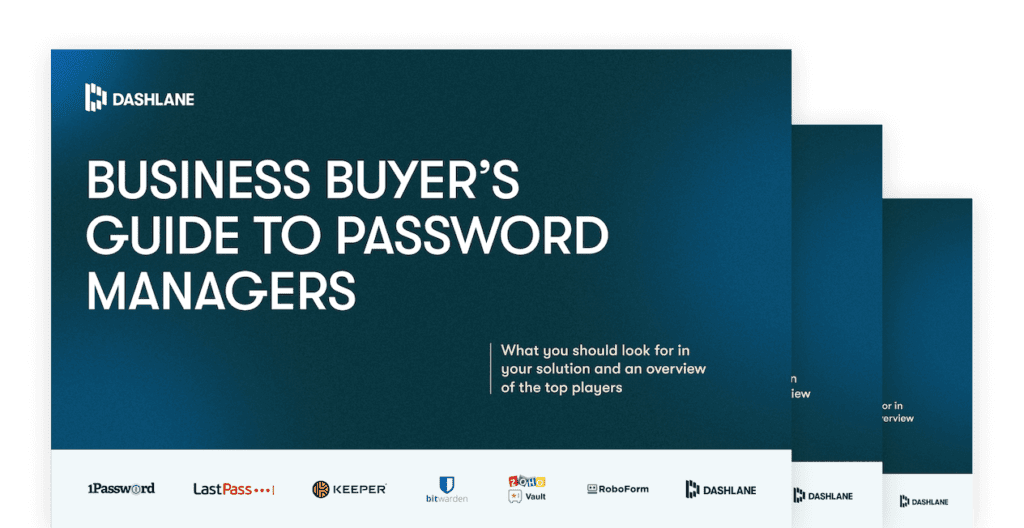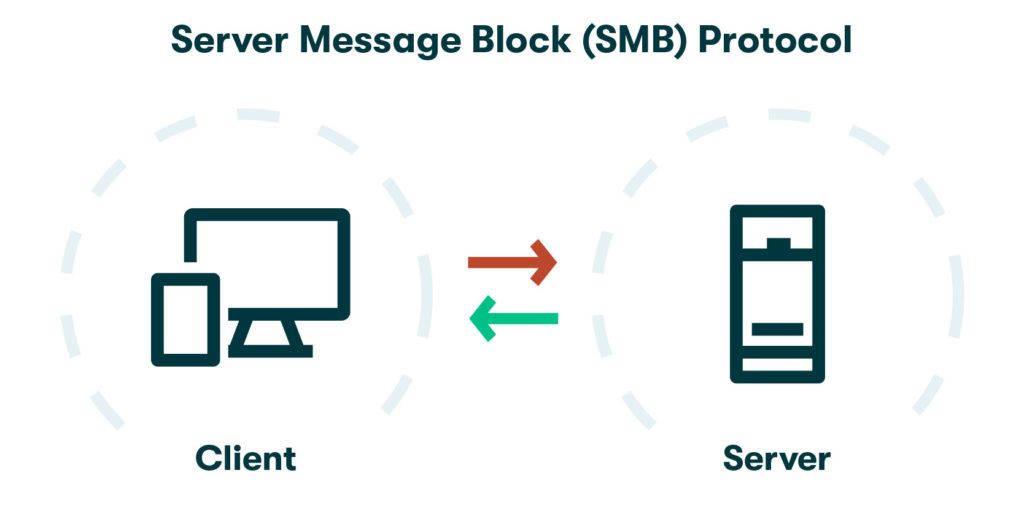Five Corporate Password Management Tools to Protect Your Company
The best corporate password management tool is a password manager. It protects employee passwords better than any other method of password storage and can be the first line of defense from cybercriminals interested in gaining access to your company’s data. But not all business password management software is created equal, especially for small- to medium-sized businesses. Comparing and contrasting different password managers will help you decide which password manager is right for your company.
Top five business password management software tools
- Dashlane
Dashlane’s business password manager stores all employee passwords in a secure, encrypted vault and is suitable for providing password protection for organizations of all industries and sizes. Dashlane business users can utilize the tool at work and at home; they even get a free family account for their household to use as well. Dashlane offers many intuitive features and customizable settings, including single sign-on (SSO) integration, VPN, 2-factor authentication, and group password sharing. To support IT managers, Dashlane also offers an admin dashboard that provides data on company password health and keeps track of several security metrics such as onboarding and reused passwords.
With Dark Web Monitoring, Dashlane provides IT managers with a security dashboard and advanced reporting that monitors for data breaches and employee data on the dark web—where most stolen passwords are subsequently sold.
Dashlane also has several security features that do extra work to protect employee passwords, including 256-bit encryption (we’ll get into what that means in a bit) and a zero-knowledge architecture that prevents everyone except the user from accessing a password. With a plethora of online resources and onboarding tools, it’s not only secure but also easy to implement.
Want to make life harder for scammers?
Check out our free username generator and random password generator tools.
Think you have a strong password? Use our password strength tester tool to put it to the test!
- Keeper
Keeper offers a host of tools that support an easy rollout, including a resource library that demonstrates how to use the tool, password import and password recovery features, and syncable policy controls. Full access to the policy controls is only available with higher-cost plans, however. In fact, many of Keeper’s features are price-fenced: implementation, same-day support, and the BreachWatch tool—a key feature for organizational and individual security—are pricey add-ons. Further, Keeper doesn’t offer a VPN, which can put data at risk if employees ever need to use public WiFi to access work applications.
- 1Password
1Password offers features such as reporting dashboards, password monitoring, and multifactor authentication. Several of its capabilities are available based on the pricing tier that a business can purchase. Higher-paying tiers earn access to integrations that support a company-wide rollout and 24/7 live support. However, it does not offer SSO integration—which can become complicated when your employees have to remember their SSO credentials and password manager sign-on—or use a password changer tool. 1Password can also be difficult to use if you’re a new customer who is using both a business password vault and a personal password vault.
- LastPass
LastPass offers SSO integration, as well as its own SSO and multifactor authentication platforms. Its analytics tools include dark web monitoring and a security dashboard, and it provides comprehensive reporting and company-wide policy enforcement tools. It also recently extended access to families of employees. However, LastPass doesn’t offer a VPN, which can cause issues when employees want to access apps remotely or work using public WiFi.
Also important to note is that its security architecture isn’t foolproof. LastPass has a history of security breaches and limited live support for people who purchase any package below the most expensive plan.
- BitWarden
BitWarden is the only password manager on this list that is open-source, which can be useful for ultra-technical industries or employee roles. It also has a secure file-sharing tool that can be used to share with people who don’t use BitWarden. While it does offer extensive customer support and password monitoring, some drawbacks of this tool include limited policy settings, complicated SSO integration, and limited account recovery capabilities.
Given that BitWarden is known to be a bit more difficult for beginners to get the hang of, users may struggle to take full advantage of the tool they offer, which can hinder employee adoption. It also doesn’t have an account recovery option for basic package subscribers, nor does it offer a password changer.

For a full summary of factors to consider when purchasing a password manager tool for your organization, read Dashlane’s Business Buyer’s Guide.
What is a server message block (SMB), and why does securing SMB protocol matter?
A server message block (SMB) is the protocol that allows an application to access documents on a remote server. Because SMB protocols allow for remote access to all of a user’s company files, it’s imperative that the user practices safe password management. Most notably, the well-known WannaCry ransomware attack took advantage of a weakness in SMB protocol in 2017 and infected approximately 200,000 computers across 150 countries.

While fixes to SMB protocol have since been launched, these attacks serve as an important reminder that no protocol is attack-proof. If hackers were to gain access to your SMB, they would have access to your device and to every other device that has accessed files across that network. Once hacked, SMBs provide cybercriminals with a massive web of devices to access and exploit.
How does a corporate password manager keep your company’s data safe?
Every password manager uses some level of encryption to keep a user’s password secure. Think of encryption as an additional layer of security: it scrambles a password into a different set of special characters, letters, and numbers before storing the data. This means that even if cybercriminals were to access a user’s password, they’d still need to go through the painstaking process of unscrambling the encryption. Dashlane’s Enterprise Password Manager uses 256-bit encryption, which is one of the most secure encryption options.
Another way password managers protect company data is through a master password. Each employee only needs to remember one master password that will grant them access to all their other passwords and private information. Master passwords are a great way to save employees time while still incentivizing them to come up with a strong, complex password (because there’s only one they need to remember!).
In addition to integrating into a company’s single sign-on provider, password managers’ built-in 2-factor authentication helps further ensure that only the employee is accessing their own accounts.
Enterprise password manager tool FAQs
- How does a business password manager work?
Password management tools help users strengthen their cybersecurity by generating, storing, and autofilling passwords with security architecture that other password shortcuts—like saving a password in a web browser—don’t have. Password managers can come with different features, such as:
- Single sign-on integration, which helps employees securely enter their credentials only one time to access multiple applications throughout the workday.
- 2-factor authentication, which helps keep your account secure by requiring a second factor, such as a code sent to the user’s phone number or email.
- Synchronization, which lets users sync their password manager to multiple devices across desktop or mobile, allowing for secure, easy access to accounts wherever it’s needed.
- How to select the right enterprise password manager tool
There are several different password managers available for businesses that tout a wide variety of features. Instead of comparing and contrasting each set of features against each other, consider the two factors that will actually make a difference in your organization: ease of adoption and real-world security. You’re going to want to adopt the password manager that enables a password culture and policy that your employees will actually follow. Using these criteria, you should be selecting a password manager that:
- Ensures a secure method for password sharing, so employees don’t need to share passwords through unsecured means like Slack, Microsoft Teams, or Google Chat
- Delivers breached account notifications, activity logs, and actionable password health insights
- Has a strong security history and maintains a zero-knowledge architecture
- Integrates with your existing platforms, such as your SSO provider
- Deploys across your employees’ devices automatically without assistance from IT
- Offers educational training and 24/5 support for IT and employees
- Provides a smooth onboarding and offboarding process for employees
- Includes additional features that can be bundled under one subscription, like a VPN and a free family account
- How much does a password manager for business cost?
While the cost of each service will vary depending on the features and size of your business, many password managers are very affordable. Dashlane’s Password Manager, for example, costs as little as $5 per month per user.
- How does a password manager benefit a company?
Password managers are one tool in your security arsenal that can help keep your organization protected from cybersecurity breaches. When they’re easy to use and implement, they also help with access control, workplace efficiency, and employee satisfaction.
Password managers can also be incredibly cost-efficient. At a flat rate per user, the cost of password managers like Dashlane’s scale to the size of the company, so you only pay based on the size of your organization. This makes it a great option for small- to medium-sized businesses. Considering that the average cost of data breaches for small- to medium-sized businesses is $108,000, password managers are a worthwhile investment.
“Some subscriptions are prohibitively expensive,” Ben explains. “With Dashlane, we can have one account and share logins without compromising the account when someone leaves.”
Find the right password manager for your business
After comparing and contrasting each password manager’s features, cost, and level of security, it’s time to select the right enterprise password manager for your business. Especially in the case of small- to medium-sized businesses, it’s important to consider whether your employees will actually use the features that the password manager offers. Remember that ease of use is just as important as security features.
Because several password managers offer business subscriptions that vary widely from one another, Dashlane’s Guide to Password Managers has synthesized all this information into one document that can help you choose the right tool for your organization.
Pro tip: if you’re thinking about different ways to use a password manager to achieve your security goals, it might be time to consider building out an official cybersecurity strategy. Learn more about the core pillars of a cybersecurity strategy.
To find out if Dashlane is the right password manager for your business, get in touch with our team.
References
- Forbes, “LastPass Hacked: Password Manager With 25 Million Users Confirms Breach” August 2022
- Wikipedia, “WannaCry ransomware attack” May 2017
- ABC News, “Ransomware cyberattack hits Australia as EU warns victims worldwide may grow” May 2017
- ProWriters: Professional & Management Liability Insurance, “What’s The Expected Cost of a Data Breach for Small Businesses?” 2021
Sign up to receive news and updates about Dashlane
